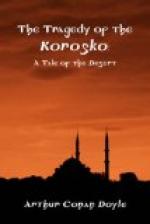Mr. Cecil Brown—to take the names in the chance order in which they appear upon the passenger list—was a young diplomatist from a Continental Embassy, a man slightly tainted with the Oxford manner, and erring upon the side of unnatural and inhuman refinement, but full of interesting talk and cultured thought. He had a sad, handsome face, a small wax-tipped moustache, a low voice and a listless manner, which was relieved by a charming habit of suddenly lighting up into a rapid smile and gleam when anything caught his fancy. An acquired cynicism was eternally crushing and overlying his natural youthful enthusiasms, and he ignored what was obvious while expressing keen appreciation for what seemed to the average man to be either trivial or unhealthy. He chose Walter Pater for his travelling author, and sat all day, reserved but affable, under the awning, with his novel and his sketch-book upon a camp-stool beside him. His personal dignity prevented him from making advances to others, but if they chose to address him they found a courteous and amiable companion.
The Americans formed a group by themselves. John H. Headingly was a New Englander, a graduate of Harvard, who was completing his education by a tour round the world. He stood for the best type of young American—quick, observant, serious, eager for knowledge and fairly free from prejudice, with a fine balance of unsectarian but earnest religious feeling which held him steady amid all the sudden gusts of youth. He had less of the appearance and more of the reality of culture than the young Oxford diplomatist, for he had keener emotions though less exact knowledge. Miss Adams and Miss Sadie Adams were aunt and niece, the former a little, energetic, hard-featured Bostonian old-maid, with a huge surplus of unused love behind her stern and swarthy features. She had never been from home before, and she was now busy upon the self-imposed task of bringing the East up to the standard of Massachusetts. She had hardly landed in Egypt before she realised that the country needed putting to rights, and since the conviction struck her she had been very fully occupied. The saddle-galled donkeys, the starved pariah dogs, the flies round the eyes of the babies, the naked children, the importunate beggars, the ragged, untidy women—they were all challenges to her conscience, and she plunged in bravely at her work of reformation.




